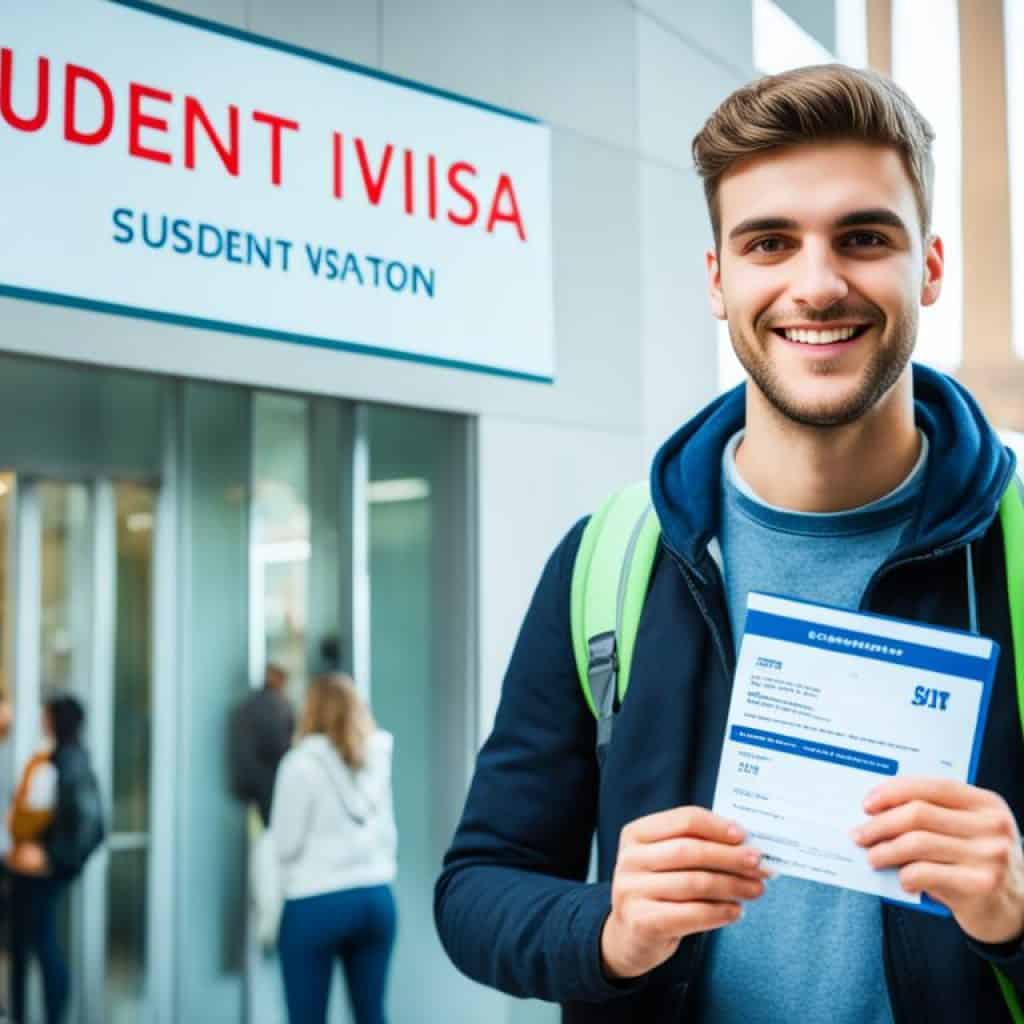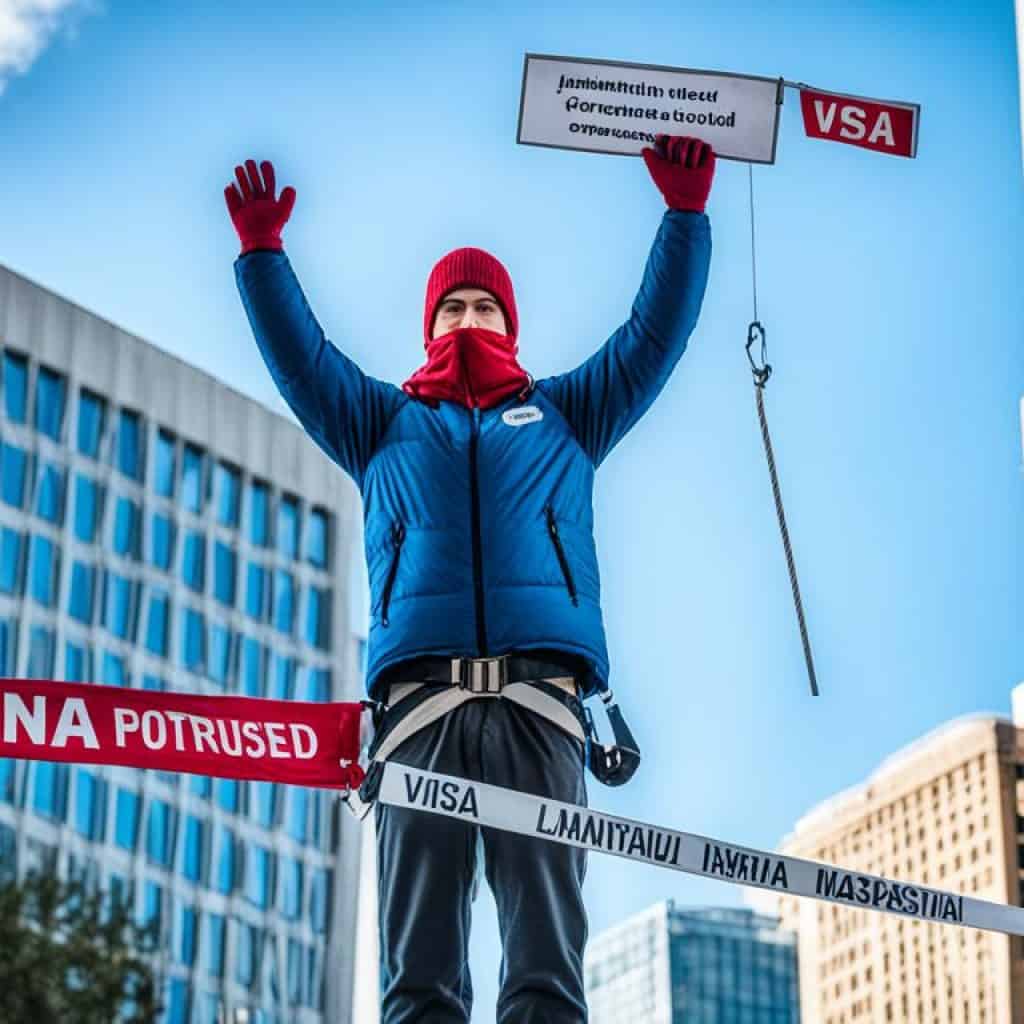Are you embarking on a visa journey and feeling overwhelmed by the complex application process and requirements? Don’t worry, we’ve got you covered. In this article, we’ll provide you with essential information and expert guidance to navigate your visa journey with ease. Whether you’re applying for a student visa or a marriage-based visa, understanding the process is crucial for a successful outcome. So, let’s dive in and unravel the mysteries of the visa application process.
Key Takeaways:
- Understanding the visa application process and specific requirements is crucial for a successful application.
- Consulting with a skilled immigration lawyer can significantly increase your chances of success.
- Transitioning from a student visa to a work visa requires expert guidance and knowledge.
- Optional Practical Training (OPT) provides valuable work experience for F-1 students.
- Seeking professional legal representation is essential to ensure a smooth visa journey.
The Student Visa (F-1)
The Student Visa (F-1) is a non-immigrant visa that offers international students the opportunity to study in the United States, providing a vital pathway for pursuing academic education in accredited institutions. Whether you dream of attending a renowned university, acquiring specialized skills, or immersing yourself in American culture, the F-1 visa opens doors to endless possibilities.
As a non-immigrant visa, the F-1 Student Visa allows you to temporarily reside in the United States and engage in full-time studies. It’s important to note that the F-1 visa is not a path to permanent residency, but rather a means to pursue educational goals on a temporary basis.
Studying in the United States offers a unique opportunity for personal and academic growth, as well as exposure to diverse cultures and perspectives.
With an F-1 visa, you can enroll in a variety of academic programs, including universities, colleges, language schools, and vocational institutions. It allows you to immerse yourself in your chosen field of study, collaborate with professors and classmates from different backgrounds, and take advantage of a world-class education system.
“The United States has some of the best educational institutions in the world, offering a wide range of programs and research opportunities.”
In order to maintain your F-1 status, it is essential to uphold certain obligations. This includes maintaining a full course load, making satisfactory academic progress, and following the rules and regulations set by the U.S. Citizenship and Immigration Services (USCIS). Compliance with these conditions ensures that your immigration status remains valid throughout your studies.
Benefits of the Student Visa (F-1)
Obtaining an F-1 visa provides numerous benefits for international students:
- Access to world-class educational institutions and academic programs
- Opportunities to develop language skills and enhance career prospects
- Exposure to diverse cultures and perspectives
- Potential for internships, practical training, and employment opportunities
- The ability to participate in cultural exchange programs and engage in extracurricular activities
“The F-1 visa is your gateway to academic excellence, personal growth, and a global network of connections.”
Understanding the intricacies of the F-1 visa application process and the requirements is crucial for a successful journey. In the next section, we will explore the steps involved in applying for the Student Visa (F-1), including obtaining the necessary documents and preparing for the consular interview.
Applying for the Student Visa (F-1)
The Student Visa (F-1) application process is a vital step towards realizing your dreams of studying in the United States. To embark on this journey, you first need to obtain the I-20 document from the American school you plan to attend.
The I-20 document serves as proof of your acceptance and enrollment in a full-time academic program. It outlines the duration of your program, identifies the institution, and highlights your financial responsibilities. This document is crucial for initiating the consular processing required to acquire your Student Visa (F-1).
Consular processing involves an in-person interview at the US Embassy or Consulate in your home country. During this interview, a consular officer will assess your eligibility for the visa and ask about your intended educational pursuits and future plans. It is essential to prepare for this interview by familiarizing yourself with the visa requirements and demonstrating your genuine intent to study in the US.
Embarking on the Student Visa (F-1) application process can be daunting, but with careful preparation and the guidance of an experienced immigration lawyer, you can navigate the intricate steps with confidence.
Having a complete understanding of the application process, the importance of the I-20 document, and the consular processing requirements will help ensure a smooth journey towards obtaining your Student Visa (F-1). By approaching the application process with diligence and seeking expert advice, you can improve your chances of a successful outcome.
Key Steps for Applying for the Student Visa (F-1)
When applying for the Student Visa (F-1), follow these key steps:
- Receive acceptance and the I-20 document from your chosen US educational institution.
- Pay the SEVIS fee and obtain the receipt as proof of payment.
- Schedule an appointment for your consular interview at the US Embassy or Consulate in your home country.
- Prepare the necessary documentation, including your passport, the I-20 document, the SEVIS fee receipt, proof of financial support, and additional supporting documents requested by the embassy or consulate.
- Attend the in-person consular interview and answer questions honestly and confidently.
- Submit your biometric information, such as fingerprints and a photograph, if required.
- Wait for the visa processing to be completed and receive your passport with the Student Visa (F-1) if approved.

Remember, the Student Visa (F-1) application process is a significant milestone on your journey to pursue an education in the United States. With meticulous planning and the support of trusted resources, you can overcome any challenges and make your dreams become reality.
The Importance of a Skilled Student Visa (F-1) Lawyer
Navigating the Student Visa (F-1) process can be challenging, especially for international students who are unfamiliar with the complex legal requirements. This is why having a skilled Student Visa (F-1) lawyer by your side is essential to ensure a smooth and successful application process.
A skilled lawyer specializing in Student Visa (F-1) cases can provide expert legal representation and guidance throughout the entire process. They have a deep understanding of the visa application requirements and can help you compile all the necessary documentation, ensuring that your application is thorough and accurate.
One of the key advantages of having a skilled lawyer is their ability to offer expert legal advice tailored to your unique circumstances. They can answer any questions you may have, clarify complex immigration laws, and provide insightful guidance to increase the chances of a successful application.
Moreover, a competent lawyer can help you navigate any potential challenges that may arise during the process. They are familiar with the common pitfalls and can help you avoid costly mistakes that could jeopardize your chances of obtaining a Student Visa (F-1).
“A skilled Student Visa (F-1) lawyer can be your advocate, ensuring that your rights are protected throughout the application process. They will work diligently to present your case in the most favorable light and increase the likelihood of a successful outcome.”
Choosing the right lawyer is crucial for your Student Visa (F-1) journey. Look for a lawyer with experience in student visas who can provide the expert legal representation you need. Consider their track record of success, client testimonials, and their understanding of the specific requirements of the Student Visa (F-1) process.
By investing in expert legal representation, you can navigate the Student Visa (F-1) process with confidence, knowing that your application is in capable hands. A skilled Student Visa (F-1) lawyer will be an invaluable ally in helping you turn your dream of studying in the United States into a reality.
Transitioning from F-1 to H1-B
Transitioning from an F-1 Student Visa to an H1-B work visa can be a challenging and complex process. To ensure a smooth and successful transition, it is highly recommended to hire an experienced immigration lawyer who specializes in these types of visa transitions. An immigration lawyer can provide invaluable assistance throughout the entire process, from gathering the necessary documents to completing the required forms.
With their expertise and knowledge of the immigration laws and regulations, an immigration lawyer can guide you through each step and provide legal advice tailored to your specific situation. They will help you navigate the intricacies of the process and ensure that all the necessary requirements are met, increasing your chances of a successful outcome.
Whether you are seeking employment in the United States or planning to change your status from a student visa to a work visa, an immigration lawyer can provide the expertise and support needed to make the transition smoother and less stressful. From filing the appropriate forms to preparing for interviews, an immigration lawyer will be by your side, helping you navigate the complexities and ensuring that your rights are protected.
Working with an immigration lawyer who specializes in transitioning from an F-1 to an H1-B visa can make a significant difference in the outcome of your visa application. They will provide you with a comprehensive understanding of the process, guide you through potential challenges, and provide you with the best possible chance of successfully obtaining a work visa in the United States.
| Benefits of Hiring an Immigration Lawyer for F-1 to H1-B Transition |
|---|
| Expert knowledge of immigration laws and regulations |
| Thorough understanding of the F-1 to H1-B transition process |
| Assistance in gathering and organizing the required documents |
| Guidance in completing the necessary forms accurately |
| Legal advice tailored to your specific situation |
| Representation and support throughout the entire process |
Hiring an immigration lawyer specializing in F-1 to H1-B transitions can give you peace of mind and confidence as you navigate the complexities of the visa application process. With their expertise and support, you can focus on your career goals and transition smoothly to a work visa in the United States.
Understanding Optional Practical Training (OPT)
Optional Practical Training (OPT) is a valuable opportunity for F-1 students to gain work experience in their field of study while maximizing employment opportunities for their future. By participating in OPT, students can apply their knowledge and skills in a professional setting, enhancing their resumes and preparing for their careers.
During OPT, F-1 students can work for up to a year, either during or after their academic program. This practical training allows them to gain real-world experience, apply their classroom learning, and develop new skills that will be valuable in their future employment.
Procedures and Timelines
Before participating in OPT, F-1 students must first obtain authorization from their designated school official (DSO) and the United States Citizenship and Immigration Services (USCIS). The process involves filing Form I-765, along with supporting documents and the required fees.
Once approved, students can begin their OPT employment. It’s important to note that the employment must be directly related to the student’s major area of study, providing practical training and experience in their chosen field.
Students can choose to engage in pre-completion OPT, which allows them to work during their program of study, or post-completion OPT, which begins after the completion of their program. Both types have their own timelines and eligibility criteria, as determined by the USCIS.
Potential Issues to Consider
While OPT provides numerous benefits, there are certain factors that students should be aware of to ensure a successful experience. These may include maintaining valid F-1 status, adhering to the regulations and restrictions of OPT employment, and understanding the impact of OPT on future employment-based visa opportunities.
Additionally, students should be prepared for the potential challenges that come with job searching, competition, and visa implications. Seeking guidance from experienced immigration lawyers who specialize in student visas can provide valuable insights and advise students on how to navigate these issues effectively.
With the right knowledge and guidance, participating in OPT can be a transformative experience for F-1 students. It allows them to gain practical work experience, enhance their skill set, and explore potential employment opportunities. By leveraging OPT effectively, students can take a proactive step towards achieving their career goals and building a successful future.
Optional Practical Training (OPT) provides work experience to F-1 students, expanding their employment opportunities in their field of study. By understanding the procedures, timelines, and potential issues related to OPT, students can make the most of their work experience and pave the way for a successful career.
Change of Status, Travel, and More
As an F-1 student, you may encounter situations that require a change of status, such as transferring to a different academic program or institution. Additionally, planning travel while maintaining your F-1 status and dealing with visa renewals and extensions can be complex processes.
To navigate these scenarios successfully, it is crucial to seek guidance from specialized immigration lawyers who can provide expert advice and support. They can help you understand the necessary steps and requirements involved in change of status, travel on a student visa, and visa renewals.
Whether you need to transfer to a new program, travel internationally, or extend your visa, an immigration lawyer will ensure that you have accurate information and that your documentation is complete and in compliance with immigration regulations.
“Working with an immigration lawyer can make a significant difference in the change of status, travel, and visa renewal processes. Their expertise and guidance will help you navigate these complex situations smoothly and with confidence.”
Change of Status
Changing your status as an F-1 student may be necessary if you decide to transfer to a different academic institution or program within the United States. This process involves submitting various documents and applications, and an immigration lawyer can assist you in completing them accurately and on time.
Travel on a Student Visa
Planning to travel while holding an F-1 visa requires careful consideration of your immigration status. You must ensure that your visa will still be valid upon your return to the United States. An immigration lawyer can guide you through the necessary steps and provide you with the information needed to travel while maintaining your legal status.
Visa Renewals
Renewing your F-1 visa before it expires is essential if you wish to continue your studies or remain in the United States legally. An immigration lawyer can assist you in understanding the renewal process, preparing the required documentation, and ensuring that your application is complete and accurate.
By consulting with a specialized immigration lawyer, you will have the support and expertise needed to handle change of status, travel, and visa renewal matters effectively.
Guidance on Maintaining Lawful Status
As an F-1 student, maintaining lawful status is essential for a successful visa journey. It is crucial to understand the rules and regulations that govern your status and take necessary steps to comply with them. Seeking guidance from immigration lawyers with expertise in student visas can provide you with the necessary support and advice throughout your journey.
One important aspect of maintaining lawful status is understanding the guidelines for travel and re-entry to the United States. Whether you plan to visit your home country or explore other destinations, it is essential to ensure that you have the appropriate documents and permissions to smoothly navigate the travel process. Immigration lawyers can guide you on the necessary steps to take and help you avoid any complications that may arise during re-entry.
Another crucial consideration for F-1 students is visa extensions. Depending on the length of your program, you may need to extend your visa to continue your studies legally. Visa extensions require careful planning and adherence to specific procedures. Immigration lawyers can assist you in understanding the requirements, gathering the necessary documentation, and submitting a strong application for your visa extension.
Benefits of Seeking Professional Guidance
“Working with an experienced immigration lawyer can provide peace of mind and ensure that you are on the right track to maintaining a lawful status in the United States. These professionals have in-depth knowledge of the visa regulations and can help you navigate the complexities of the process. They can guide you on maintaining compliance with the rules, answer your questions, and provide personalized advice based on your unique circumstances.”
By seeking guidance from immigration lawyers with expertise in student visas, you can have confidence in your ability to maintain lawful status throughout your visa journey. They can provide the necessary support and guidance on travel and re-entry, as well as assist with visa extensions. This professional assistance ensures that you can focus on your studies and enjoy your time in the United States without the stress of legal violations or complications.

| Benefits of Seeking Guidance from Immigration Lawyers | How Immigration Lawyers Can Assist |
|---|---|
| 1. In-depth knowledge of visa regulations | 1. Provide accurate information on rules and regulations |
| 2. Personalized guidance based on individual circumstances | 2. Offer personalized advice tailored to your situation |
| 3. Expertise in travel and re-entry requirements | 3. Guide you on the necessary documents and procedures for travel and re-entry |
| 4. Assistance with visa extensions | 4. Help you understand the requirements and assist with the visa extension process |
| 5. Peace of mind throughout the visa journey | 5. Provide support and guidance to ensure compliance and minimize stress |
What to Expect in an Immigration Lawyer Consultation
Consulting with an immigration lawyer is a crucial step in your visa journey. An initial consultation with a skilled and experienced immigration lawyer can provide you with valuable insights, assistance, and guidance. During this consultation, you can expect the following:
Case Review and Assessment
The immigration lawyer will carefully review your case and assess its strengths and weaknesses. They will analyze your specific circumstances, including your visa application, background, and any potential challenges. This thorough review allows the lawyer to gain a comprehensive understanding of your situation.
Discussion of Potential Strategies
Based on the case review, the immigration lawyer will discuss potential strategies and options available to you. They will explain the various pathways, legal requirements, and processes that may be relevant to your situation. This discussion aims to provide you with a clear understanding of the potential strategies to pursue.
Expert Advice and Recommendations
The lawyer will provide expert advice based on their knowledge and experience in immigration law. They will offer recommendations tailored to your specific case and guide you on the best course of action. This advice can be invaluable in making informed decisions regarding your student visa (F-1) process.
Answers to Your Questions
Your consultation is an opportunity to ask any questions you may have about your visa journey. The immigration lawyer will address your concerns, clarify any doubts, and provide you with the information you need to move forward. This open dialogue ensures that you have a clear understanding of your options and the steps involved.
By consulting with an immigration lawyer, you gain access to expert knowledge, personalized guidance, and a comprehensive review of your case. This consultation sets the foundation for a successful visa journey and allows you to make informed decisions about your future.
Choosing a Student Visa (F-1) Lawyer
When it comes to your student visa (F-1) journey, choosing the right lawyer can make all the difference. It’s essential to find a lawyer who not only possesses legal expertise in immigration law but also understands the complexities of your journey and can provide guidance at every step. By selecting a lawyer with a proven track record of successful outcomes, you can increase your chances of a smooth and successful visa process.
“A skilled lawyer can be your trusted ally throughout the student visa (F-1) application process. They have the legal knowledge and experience to navigate the complexities of immigration law and ensure that your application is thorough and accurate. They can guide you through the required documentation, assist with interview preparations, and address any concerns or questions you may have.”
Legal expertise is a crucial factor to consider when choosing a student visa lawyer. Look for an attorney who specializes in immigration law and has extensive experience specifically with student visa (F-1) cases. This specialization ensures that they are up-to-date with the latest regulations and requirements, increasing the likelihood of a successful outcome for your application.
In addition to legal expertise, it’s important to find a lawyer who empathizes with the challenges and unique situations that international students often face. Navigating the visa journey can be overwhelming, and having a lawyer who understands and supports you can provide peace of mind throughout the process.
Choosing the Right Student Visa Lawyer
Here are some key factors to consider when selecting a student visa (F-1) lawyer:
- Experience: Look for a lawyer with a demonstrated history of successfully handling student visa (F-1) cases. This experience ensures that they have encountered various scenarios and know how to handle potential challenges that may arise during your application process.
- Reputation: Research the lawyer’s reputation within the immigration law community and among previous clients. Reading reviews and testimonials can provide insights into their professionalism, communication, and ability to deliver successful outcomes.
- Communication: Choose a lawyer who communicates effectively and promptly. Clear and open communication is vital in ensuring that you understand the process, requirements, and progress of your student visa (F-1) application.
- Personalized Attention: Your lawyer should provide individualized attention and tailor their guidance to your specific circumstances. They should take the time to listen to your concerns, answer your questions, and address any unique challenges you may be facing.
By considering these factors and conducting thorough research, you can select a student visa (F-1) lawyer who possesses the legal expertise, experience, and empathy necessary to guide you through the visa application process successfully.
Comparing Student Visa (F-1) Lawyers
| Factor | Lawyer A | Lawyer B | Lawyer C |
|---|---|---|---|
| Years of Experience | 10+ | 5 | 15+ |
| Success Rate | 85% | 75% | 90% |
| Client Reviews | â â â â â | â â â ââ | â â â â â |
| Communication | Excellent | Good | Excellent |
| Personalized Attention | Yes | No | Yes |
Note: The table above provides a simple comparison of different student visa (F-1) lawyers based on key factors. It is essential to conduct extensive research and consider additional factors to make an informed decision.
The Importance of Professional Legal Representation in Immigration Matters
When it comes to your student visa application, professional legal representation can make all the difference. Navigating the complexities of immigration matters requires expertise and knowledge that only experienced lawyers possess. They play a crucial role in ensuring your application is accurate, thorough, and stands the best chance of success.
“The value of professional legal representation cannot be overstated. It is an investment in your future and the realization of your American dream,” says Jane Thompson, a renowned immigration lawyer with over 20 years of experience.
Lawyers specializing in immigration matters understand the intricate processes involved and can simplify them for you. They have in-depth knowledge of the specific requirements for student visa applications and can guide you through each step. With their expertise, you can navigate potential pitfalls and avoid costly mistakes that could jeopardize your chances of securing a student visa.
Legal Expertise and Accurate Applications
One of the key benefits of professional legal representation is the expertise they bring to your case. They are well-versed in immigration laws, regulations, and procedures, ensuring that your application adheres to all the necessary requirements. By working with a skilled lawyer, you can have confidence that your application will be accurate, complete, and submitted on time.
“Immigration matters can be complex, and having an experienced lawyer on your side can provide peace of mind. They can help you navigate the intricacies of the process, answer your questions, and guide you towards the best course of action,” highlights Michael Johnson, an immigration lawyer renowned for his success in student visa applications.
Maximizing Your Chances of Success
The professional legal representation provides you with the best opportunity to present a strong case to immigration authorities. Lawyers with experience in immigration matters understand what the decision-makers are looking for and can help you gather the necessary supporting documents and evidence. They can assist in crafting persuasive arguments that highlight your qualifications, intentions, and commitment to complying with visa requirements.
By leveraging their expertise, lawyers can ensure that your application stands out among competitors and increases your chances of securing a student visa. They can also advise you on any additional steps you may need to take to strengthen your case, such as improving your English language skills or enrolling in preparatory courses.
The Key Role in Turning Your Dream into Reality

Professional legal representation is an invaluable resource in the pursuit of your American dream. Lawyers well-versed in immigration matters have helped countless individuals navigate the visa application process and successfully achieve their goals. With their support, you can minimize stress, save time, and focus on preparing for your exciting journey ahead.
| Benefits of Professional Legal Representation in Immigration Matters |
|---|
| Expertise in immigration laws, regulations, and procedures |
| Accurate and thorough application preparation |
| Guidance through complex immigration processes |
| Increased chances of securing a student visa |
| Support in gathering necessary supporting documents and evidence |
| Assistance in crafting persuasive arguments and highlighting qualifications |
| Expert advice and guidance throughout the application process |
| Minimized stress and increased peace of mind |
Don’t leave your student visa application to chance. Seek professional legal representation and put yourself on the path to success.
The CR1 Visa: A Pathway to Reunion
The CR1 Visa, also known as a marriage-based visa, offers a unique opportunity for spouses of US citizens to reunite and build a future together in the United States. This visa provides a pathway to permanent residency, allowing couples who have been separated by borders to finally be together.
Applying for the CR1 Visa involves following a specific set of steps and providing the necessary documentation to establish the validity of the marriage. It is essential to understand the process and meet the requirements to increase the chances of a successful application.
CR1 Visa Requirements
To qualify for the CR1 Visa, certain requirements must be met. These include:
- Being legally married to a US citizen
- Having a genuine marital relationship
- Providing sufficient evidence to prove the authenticity of the marriage
- Meeting financial requirements to demonstrate the ability to support the foreign spouse
By fulfilling these requirements and submitting a strong application, couples can embark on a journey towards permanent residency in the United States.
The CR1 Visa Application Process
The CR1 Visa application process involves several steps, starting with the filing of the I-130 petition. This petition establishes the validity of the marital relationship and acts as the foundation for the visa application. Once the petition is approved, the case is forwarded to the National Visa Center (NVC) for further processing.
At the NVC stage, various documents and fees are submitted, including the Affidavit of Support, civil documents, and the DS-260 immigrant visa application. The foreign spouse must also undergo a medical examination and attend an interview at the US Embassy or Consulate in their home country.
CR1 Visa Application Process
| Step | Description |
|---|---|
| 1. File the I-130 petition | Submit the I-130 petition to establish the validity of the marriage |
| 2. NVC processing | Submit necessary documents and fees to the National Visa Center (NVC) |
| 3. Medical examination | Undergo a medical examination to ensure admissibility to the United States |
| 4. Attend the visa interview | Attend an interview at the US Embassy or Consulate to provide additional information and answer questions about the relationship |
| 5. Visa issuance | Upon approval, the CR1 Visa is issued, granting the foreign spouse entry and legal status in the United States |
Completing each step of the CR1 Visa application process accurately and diligently is crucial to ensure a smooth and successful journey towards permanent residency.
The CR1 Visa Application Process
The CR1 Visa application process is a crucial step in bringing spouses of US citizens together and granting them permanent residency in the United States. This section will guide you through the essential steps and requirements to ensure a smooth and successful application.
To begin the CR1 Visa application process:
- File the I-130 petition: The I-130 petition serves as evidence of the genuine marital bond between the US citizen petitioner and the foreign spouse. It is important to accurately and comprehensively fill out the petition form, providing all necessary information.
- Compile documentary evidence: Supporting your CR1 Visa application with documentary evidence is crucial. This may include marriage certificates, joint financial records, photographs, affidavits from family and friends, and any other relevant proof of a bona fide marriage.
- Submit the application to the appropriate USCIS office: Once the I-130 petition and accompanying documents are complete, they should be submitted to the United States Citizenship and Immigration Services (USCIS) office responsible for processing family-based immigrant visa applications.
- Pay the required fees: The CR1 Visa application process involves payment of various fees, including the filing fee for the I-130 petition. Ensure that all necessary fees are paid accurately and on time.
Important considerations during the application process:
- Follow USCIS instructions: It is vital to carefully read and follow the instructions provided by USCIS during the CR1 Visa application process. Failure to comply with requirements may result in delays or denial of the visa.
- Provide accurate and complete information: Double-checking all information provided in the application, ensuring its accuracy and completeness, is crucial in avoiding unnecessary delays or complications.
- Keep copies of all documents: Make copies of all documents submitted with the application for your own records. These copies can be helpful if any documentation issues arise during the process.
- Stay informed about processing times: USCIS provides estimated processing times for visa applications. Regularly check the USCIS website to stay updated and manage your expectations regarding the processing time for your CR1 Visa application.
“Properly completing and compiling the required documentation is essential in ensuring a successful CR1 Visa application. Take the time to gather all the necessary evidence, provide accurate information, and carefully follow USCIS instructions.”
By meticulously following the CR1 Visa application process and meeting all requirements, you increase your chances of a successful outcome. The next section will provide guidance on navigating government agencies involved in the CR1 Visa journey.
Navigating Government Agencies for the CR1 Visa
When pursuing the CR1 Visa, it is important to understand the role of various government agencies in the application process. Interacting with agencies such as USCIS, NVC, and the US Embassy or Consulate is an integral part of navigating the CR1 Visa journey. Each agency has its own set of processes and requirements that must be followed meticulously to ensure a successful application.
USCIS: United States Citizenship and Immigration Services
The first step in the CR1 Visa application process involves submitting the I-130 petition to USCIS. This petition establishes the authenticity of the marital relationship between the US citizen petitioner and the foreign spouse. USCIS reviews the petition and, upon approval, forwards it to the next stage of the process.
NVC: National Visa Center
Once the I-130 petition is approved by USCIS, it is sent to the NVC for further processing. NVC is responsible for collecting the required documents and fees, scheduling the applicant’s interview at the US Embassy or Consulate, and ultimately preparing the case for the consular officer’s review.
US Embassy or Consulate
The final step in the CR1 Visa journey involves attending an interview at the US Embassy or Consulate in the applicant’s home country. The consular officer assesses the eligibility and admissibility of the applicant, reviews the supporting documents, and conducts the interview. If approved, the applicant’s passport will be stamped with the CR1 Visa, allowing them to travel to the United States and reunite with their US citizen spouse.
Understanding the processes and requirements of each government agency involved in the CR1 Visa journey is essential for a successful application. Working with an experienced immigration lawyer can provide invaluable guidance in navigating these agencies and ensuring all necessary steps are taken to maximize the chances of a favorable outcome.
| Government Agency | Description |
|---|---|
| USCIS | United States Citizenship and Immigration Services |
| NVC | National Visa Center |
| US Embassy or Consulate | Embassy or Consulate of the United States in the applicant’s home country |
Conclusion
The Visa journey is a complex and challenging process, whether you are applying for a Student Visa (F-1) or a CR1 Visa. Having professional legal representation is crucial for navigating the intricacies and increasing the chances of success. By choosing the right lawyer who specializes in immigration matters, you can receive expert guidance and support throughout your visa journey.
Professional representation ensures that your visa application is accurate, thorough, and in compliance with the specific requirements set by government agencies. A skilled lawyer will guide you through each step of the process, helping you gather necessary documents, complete forms, and navigate through potential roadblocks. With their expertise, you can focus on your American dream, confident that your application is in capable hands.
Investing in professional legal representation is an investment in your future. By seeking the guidance of an experienced immigration lawyer, you are taking proactive steps towards achieving your American dream. They understand the complexities of the visa journey and are dedicated to providing the best possible outcomes for their clients. With professional representation, you can navigate the visa process with confidence and work towards building a new life in the United States.
FAQ
What is the visa application process like?
The visa application process can vary depending on the type of visa you are applying for. Generally, it involves gathering the necessary documents, completing the application forms, paying the required fees, and attending a visa interview.
What are the visa requirements?
Visa requirements differ based on the type of visa and the country you are applying from. Generally, you will need a valid passport, a completed application form, supporting documents such as proof of financial stability and purpose of travel, and payment of the visa fees.
How long does it take to process a visa application?
The processing time for a visa application can vary depending on several factors, including the type of visa and the volume of applications received. It is always best to check with the specific embassy or consulate for the most accurate and up-to-date processing times.
What documents do I need for my visa application?
The specific documents required for your visa application will depend on the type of visa you are applying for. However, common documents include a valid passport, completed application forms, proof of financial stability, travel itinerary, and any supporting documents relevant to your visa category.
How can I track my visa application status?
Tracking your visa application status can typically be done through the embassy or consulate’s website or by contacting the visa application center. You will usually need your application reference number or passport number to access the status information.
How do I schedule a visa interview?
To schedule a visa interview, you will need to visit the embassy or consulate’s website or contact the visa application center. They will provide instructions on how to schedule an appointment and the documents you need to bring for the interview.
How much are the visa fees?
Visa fees vary depending on the type of visa and the country you are applying from. The specific fee amounts can be found on the embassy or consulate’s website or by contacting the visa application center.
Can I reschedule my visa appointment?
In most cases, you can reschedule your visa appointment. However, it is important to check the specific rescheduling policies and procedures of the embassy or consulate where you are applying.
What should I expect during the visa interview?
During the visa interview, a consular officer will ask you questions about your visa application and the purpose of your travel. They may also review your supporting documents. It is important to be prepared, answer questions honestly, and provide any requested information or documents.
How can I find an immigration lawyer to help with my visa application?
You can find an immigration lawyer by researching reputable law firms, seeking referrals from friends or family, or using online directories. It is important to choose a lawyer with expertise in the specific visa category you are applying for.
What is the expected cost of hiring an immigration lawyer?
The cost of hiring an immigration lawyer can vary depending on factors such as the complexity of your case, the lawyer’s experience, and the services provided. It is best to discuss fees and payment structures with potential lawyers during an initial consultation.
Can an immigration lawyer guarantee the approval of my visa application?
While an immigration lawyer can increase your chances of a successful visa application by providing expert guidance and ensuring your application is thorough and accurate, they cannot guarantee approval. Consular officers have the final decision-making authority.
What is the CR1 Visa?
The CR1 Visa is a marriage-based visa that allows the spouse of a U.S. citizen to enter the United States with the intention of obtaining lawful permanent residency.
How do I file the I-130 petition for the CR1 Visa?
The I-130 petition is filed with the United States Citizenship and Immigration Services (USCIS). It serves as evidence of the genuine marital relationship and is the first step in the CR1 Visa application process.
What government agencies are involved in the CR1 Visa process?
The CR1 Visa process involves interacting with multiple government agencies, including the United States Citizenship and Immigration Services (USCIS), the National Visa Center (NVC), and the U.S. Embassy or Consulate in the applicant’s home country.








Add comment